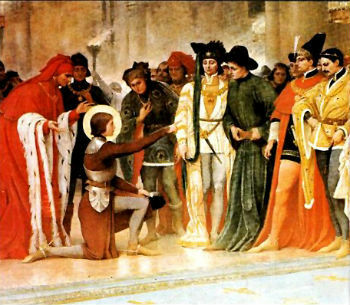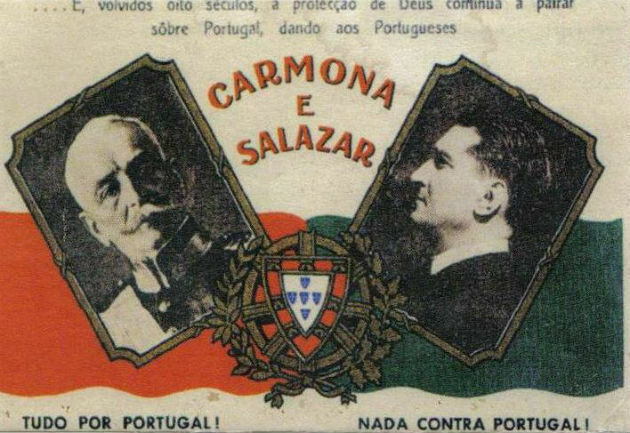Joana D'arc, known as the “Maiden of Orleans”, was a French warrior and military leader.
She is considered one of the most important historical characters in the formation of the French national state due to her military achievements.
Biography

Joan of Arc depicted in armor, the flag of Charles VII and a religious image
Joan was born approximately on January 6, 1412, in the village of Domrémy, in the region of Lorraine, France. Today, the city is called Domrémy-la-Pucelle (“Pucelle", in French, means virgin or maiden) in honor of the heroine.
Joana D’Arc was the daughter of farmers and artisans Jacques D’Arc and Isabelle Romée, the youngest of four brothers. As was common among peasants, she did not learn to read and write.
During her adolescence she would have heard voices that would entrust her with the mission of liberating France and enthroning the true king.
At the time, part of France was under English rule and the French split into those who supported them like the Burgundians. However, there were those who believed that the rightful king was Charles VII, like the Armagnacs.
Read more: low middle age
Military Vocation
Her journey begins in the year 1429, when Joan of Arc was still 16 years old. With short hair and wearing men's clothes, she traverses enemy lines for almost a year, fighting the Burgundians, until reaching Chinon, where she meets the monarch Carlos VII.
Hearing about this brave warrior, Carlos VII decides to test the veracity of her visions. For this, the sovereign invites her to her castle, but asks that no one reveal his identity to him.
She orders her nobles to dress elegantly and present themselves as the king. Joan examines some of these supposed monarchs, but does not bow to them. Only when she stops before the true King Charles VII does she bow and declare him the true King of France.
In this way, the king appoints Joan as commander of his army and assigns her a troop of more than four thousand men. With these soldiers, she liberates the city of Orleans in just three days.
Afterwards, Joan begins the mission she was destined to: lead King Charles VII to the city of Reims to be declared king.
In this city the French kings were traditionally crowned and Charles VII is made king on July 17, 1429 in the cathedral. With this, the hopes of the French people in freeing the country from English domination are renewed.
The following year, Joan of Arc restarts the military campaign and, after a series of victories, tries to liberate the city of Compiègne. In this battle, however, Joan was captured, wounded and sold to the Burgundians, allies of the English.
After months of trial, Joan was questioned about the voices she claimed to hear, as well as her male dress, and was then found guilty of heresy.
She was condemned to the stake and burned alive on May 30, 1431, in the Old Market Square in Rouen, northwestern France. At the time, the city was under English rule.
Historical context

Joan of Arc recognizes Charles VII among several gathered nobles
Joana D'Arc's life unfolds at the time of Hundred Years War, when France began the retaking of territories lost to England in northern France.
After the death of Charles VI, in the year 1422, and the coronation of Henry VI of England as the new French king, France split into two great factions. On one side we have the Burgundians who support the British.
On the other hand, there are the Armagnacs, who recognize Charles VII as the legitimate French king, starting a military campaign to enthron him.
Under Joana's leadership, Charles VII's army defeats the Burgundians and the English, recovering part of the territory. Thus, it is at the genesis of the historical formation of France as a nation.
Joan of Arc, the Saint
Reports say that, at the age of 13, Joan of Arc began to communicate with an archangel and saints. These would be Saint Michael, Saint Catherine of Alexandria and Saint Margaret of Antioquia.
However, after the death of King Charles VI, messages ordered Joan to crown Charles VII as king and save France. In this way, she joins the army to fight England.
Joan fulfilled her mission, but was captured and handed over to Inquisition. Declared guilty and condemned to the stake, years later she would be found innocent by Pope Callisto III, in 1456.
With this, after her death and acquittal, Pope Pius X performed her beatification in 1909 and, on May 9, 1920, she was canonized by Pope Benedict XV.
Finally, in the year 1922, Joan of Arc was declared patroness of France.
Learn more at medieval church
Sentences
- I'm not afraid... I was born to do this.
- I would rather die than do something that I know is a sin, or against God's will.
- There are people who believe in little or nothing and yet give their lives for that little or nothing. All we have is our life, and we live it as we believe we ought to live it, and then it is gone. But giving up what you are and living without believing in anything is more terrible than dying - even more terrible than dying young.
Curiosities
- The figure of Joan of Arc is a symbol of the French right that usually gathers in front of her statue, in Paris, to hold rallies.
- The life of the Maiden of Orleans inspired numerous works such as a play written by Friedrich Schiller in 1801 and an opera composed by Giuseppe Verdi in 1844.
- Brazilian rock group Camisa de Vênus composed the song “I Didn't Kill Joan of Arc” which became a big hit in the 80s.
Films
- The Passion of Joan of Arc, from Carl Dreyer. 1928.
- Joan of Arc, of Victor Fleming. 1948.
- Jona d'Arc by Luc Besson, in Luc Besson. 1999.
Quiz of personalities who made history
read more:
- Formation of National Monarchies
- War of the Two Roses
- Extraordinary Women Who Made History



